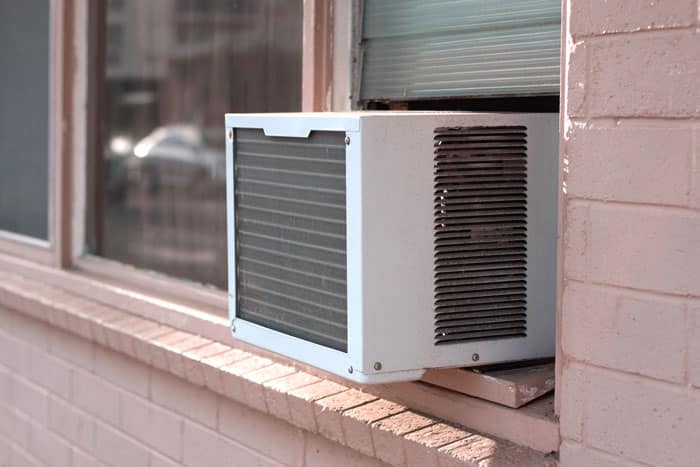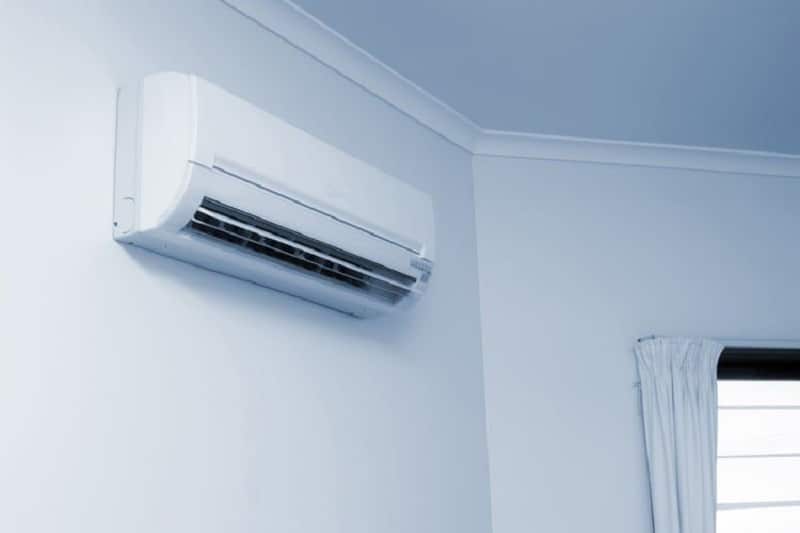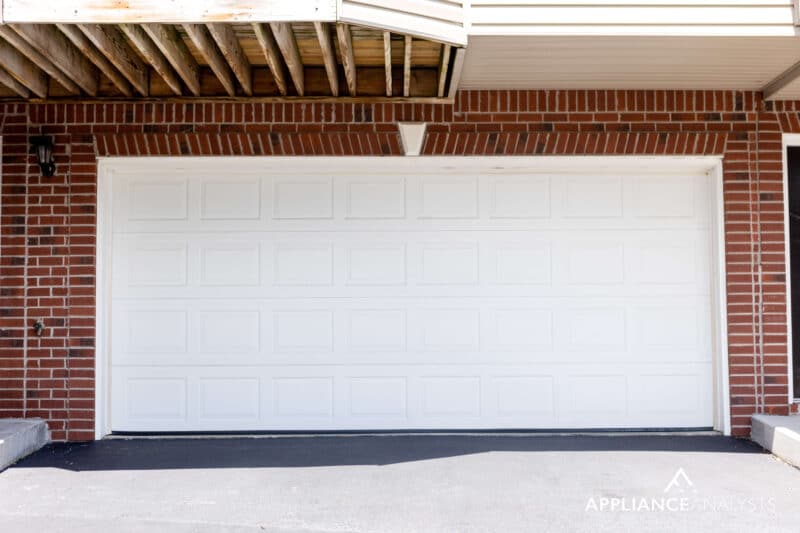Ah, summer! The perfect time to get to those projects you’ve been putting off.
With few major holidays, long days, and no snow, salt, or slush tracked in by your car, this is the season to get into the garage and finally get some work done. But one look at the thermometer and suddenly it doesn’t look too promising.
So which type of garage air conditioning would be best?
While there are a number of air conditioning options for your garage, none of them are always the best choice.
The right choice depends on what you use your garage for, and what kind of budget you have.
No matter which you choose, every garage air conditioning project should start with insulation.
Read on to learn why your garage isn’t already kept cool, what kinds of insulation to consider, and the pros and cons of major air conditioner types.
Why Isn’t My Garage Already Cool?
The modern lifestyle often takes climate control as a given. You can’t walk into a gas station without getting a blast of cold air, and you wouldn’t expect less from your house.
Despite this, we rarely see the same care for our garages, even if they’re attached to the house. They freeze up in winter and swelter in summer. What gives?
Outside of exiled husbands and the occasional pet, nothing lives in your garage but the mice. Air conditioning costs money. Most of us don’t want to pay extra to keep furry invaders in climate-controlled comfort.
Not only that, but many people spend very little time in the garage. While some of us have cars to restore, wood to work, or repairs to get done, a lot of people rely on professionals for all of these services. It simply isn’t cost-effective to make every garage the DIY expert’s paradise.
This has a few effects that make cooling your garage a bigger challenge than it might first seem.
- Unfinished attic: Even in snowy climates where the roof slopes to prevent accumulation, there’s usually not much between you and the roof itself. This means that there’s nothing but shingles and wood between your workspace and the hot, hot sun. As the roof heats up like asphalt, the unprotected inside begins to bake.
- No insulation: Just like the ceiling, the walls of most garages are rarely more than you can see. Unlike your house walls, which are stuffed with heat-trapping (or heat-resisting) insulation, the temperature outside can get right through.
- Disconnected from the central AC: Not only are garages not connected to your home’s HVAC ductwork, but they never should be. It’s often illegal, and it’s always hazardous. If you were to stretch your ducts into your connected garage, you would end up pulling the carbon monoxide, the chemical fumes, and the outdoor pollutants filling your garage into your home.
- The “Big Empty Box” effect: Most modern garages aren’t much more than a big box. That unfinished attic space can leave a ceiling two to five feet higher than the one in your home. That’s a lot more air to cool down, even if the square footage on the ground looks the same.
Thankfully, none of these issues are impossible to get past, but they’re important to keep in mind.
Choosing the Right Air Conditioner
Just like choosing the right AC for your home, finding the best one for your garage is a matter of personal choice and unique conditions. There are a few factors to consider, and we’re here to guide you through the major categories.
The right air conditioner comes down to a matter of initial cost, energy consumption, lifespan/maintenance, noise levels, and plain effectiveness.
Sadly, there is no single best air conditioner, but by figuring out which of these factors are important and which are less vital, you can find the AC that will suit your needs.
There are four major categories of air conditioners you might want to consider: portable, window, through-the-wall, and mini-split, as well as the bonus category of swamp coolers.
No matter which you choose, be sure to size it properly with our air conditioner size calculator. (Be sure to make necessary adjustments for high ceiling size (+10%), poor insulation (+10%), and direct sunlight (+10%) where necessary).
Portable Air Conditioners
Portable air conditioners usually aren’t the best pick to cool your garage on a long term basis. While these can be great for your office, many of them lack the oomph to keep a garage cooled and dehumidified.
.
If your climate is temperate and your garage gets too warm rather than too hot, a portable air conditioner can certainly give you that extra cooling for the hottest month of the year. After that, you can put it back into use in your living room or home office.
However, if temperatures get close to three digits for a good portion of the summer, it would be wiser to look at other options.
These are ductless units, but they still need a way to vent the hot air outside. Since many garages lack sliding doors and typical home windows, this might mean cutting a hole through the wall (at which point, a through the wall air conditioner might be the more attractive choice).
A portable air conditioner isn’t the strongest, sturdiest, or stealthiest option out there, but that doesn’t mean it’s all bad. If you need a little cooling for a little while, this might be your best bet.
Window Air Conditioners
If you’re fortunate enough to have a workable window with a sturdy sill in your garage, a window air conditioner might be right for you. These things are out-of-the-way, pack enough power for mid-sized garages, and are some of the more affordable options.

That window caveat is a big one, though. Even if your garage has a window, these are often an unusual (and unusable) size. Even those that could conceivably fit a window AC often need a bracket installed because they lack a sill. If that kind of installation is off-putting, you might want to think twice.
The immediate downside of any window unit is its volume. Window air conditioners can be LOUD! Because the whole machine is sitting there on the sill, the sound of the compressor and fan can drown out a lot of lighter sounds.
If you go into the garage, turn on some loud music, and start pruning your extensive bonsai collection, this won’t be a problem. But if your hope is to turn your garage into the hippest hangout in the cul-de-sac, or even just to do some group projects where communication is key, this AC could get in the way.
Through the Wall Air Conditioners
These are a less well-known type of AC unit, but they might be perfect for your garage. In a lot of ways, these are window air conditioners without the high volume and with better efficiency.
As the name suggests, through the wall air conditioners are installed through the wall. A hole is cut through, and a metal casing is inserted, allowing the AC to be slid in and, if you choose to do so later, out again.
Due to the design, the main body of the unit is on the exterior of the building, which means the noise associated with its operation is much more muted. In addition, since they’re fitted perfectly for their space, they enjoy a higher efficiency than window units.
Of course, even though they don’t need a window to work, they do require a hole in the wall, which is a project on its own. They’re also not the beefiest units out there. If you have much more than a single-car garage, you might want to look elsewhere.
Mini Split Air Conditioners
A mini split air conditioner is a ductless system that is, as the name implies, split. It has an indoor and an outdoor component, connected by an electrical line and a refrigerant line. This requires only a small hole to be cut through the wall.

Mini split air conditioners are great! If this were just an article about the best air conditioner to have for your garage, this would be the right answer. They are powerful, quiet, energy-efficient, and whisper-quiet!
However, every silver lining has a cloud, and for these units, that would be the purchase and installation costs. A reliable Mitsubishi mini split air conditioner will run you at least $1,500, and the installation costs can more than double that. While you probably won’t hit $5,000, spending over $3,000 to cool down your garage can be intimidating.
Your Other Option: Swamp Coolers
A swamp cooler, also known as an evaporative cooler, isn’t an air conditioner, technically speaking. These rely on the evaporation of water to steal heat out of the air. While we normally don’t recommend swamp coolers for home cooling, they can be surprisingly effective in certain garage settings.
If you do a lot of work with the garage door wide open, traditional air conditioners are just throwing money away. All the cool air gets out. Swamp coolers, however, release a lot of water vapor that has to go somewhere.
If your climate isn’t already humid and your summer temperatures are not too extreme, swamp coolers might provide some minor but meaningful relief.
A Note on Insulating Your Garage
When it comes to AC, insulation is the most important thing.
Uninsulated, your garage will barely retain any cooled air (and yet somehow trap extra heat from the sun beating down on it)!
The process of insulating your garage isn’t difficult, but it will cost a bit of money. How much it costs depends on local conditions, how finished it already is, and how far you want to go.
There are different lengths you can go to when insulating your garage. Depending on how much time you want to spend there (and therefore how expensive your cool air loss becomes), you might only want to pay for a few of these.
- Garage Door Insulation: Probably the best first step, insulating your garage door is the simplest way to begin protecting your garage from the elements. You can replace your current door with an insulated model, but if that’s a bridge too far, there are ways to insulate your current door. Be sure to check the insulation strips around the door too!
- Window Insulation: You can make an appreciable difference in window heat transfer simply by applying an insulation film, available in stores. If you really wanted, you could even just tape some bubble wrap on to see a similar (if less elegant) effect. A lot of heat from windows comes from the sunlight getting through—curtains alone will make a big difference.
- Ceiling Insulation: All that sunlight beating on your roof easily exceeds 100℉ even in mild climates. Adding rolls of foam insulation to the attic space (floor or ceiling, depending on how finished it is) helps keep that heat from coming in.
- Wall Insulation: You might not need to insulate every wall if you’re looking to save money. Consider the angles the sun shines on your garage in the summer. Which walls receive the most light and heat? Just insulating these can change your garage from a sauna to a sanctuary.

All the insulation in the world, however, won’t save you from a common problem in garages: air leaks. Old window frames, slightly outsized doorframes, and simple wear and tear might not fly in the house, but out here, it can slip through the (pun intended) cracks.
Insulated doors, windows, and walls don’t mean much if the cold air can escape around them.
The insidious part of these leaks is that you might still be able to cool down your garage while the air slips out. However, it will make your air conditioner work harder and longer. This means a higher energy cost and a shorter (sometimes much shorter) lifespan—not to mention the plain discomfort of waiting longer for a less lasting cooling!
Conclusion
A climate-controlled garage is always going to be an expense and isn’t the right choice for everyone. However, if the idea of spending long, hot summers out in the garage—or not being able to at all—seems even worse to you, it’s worth considering.
Depending on your needs and budget, the right insulation and air conditioner combination won’t be hard to find. Have a cool and productive summer!
Thanks for checking out our site! For other appliance tips, consider checking out our related articles below!







